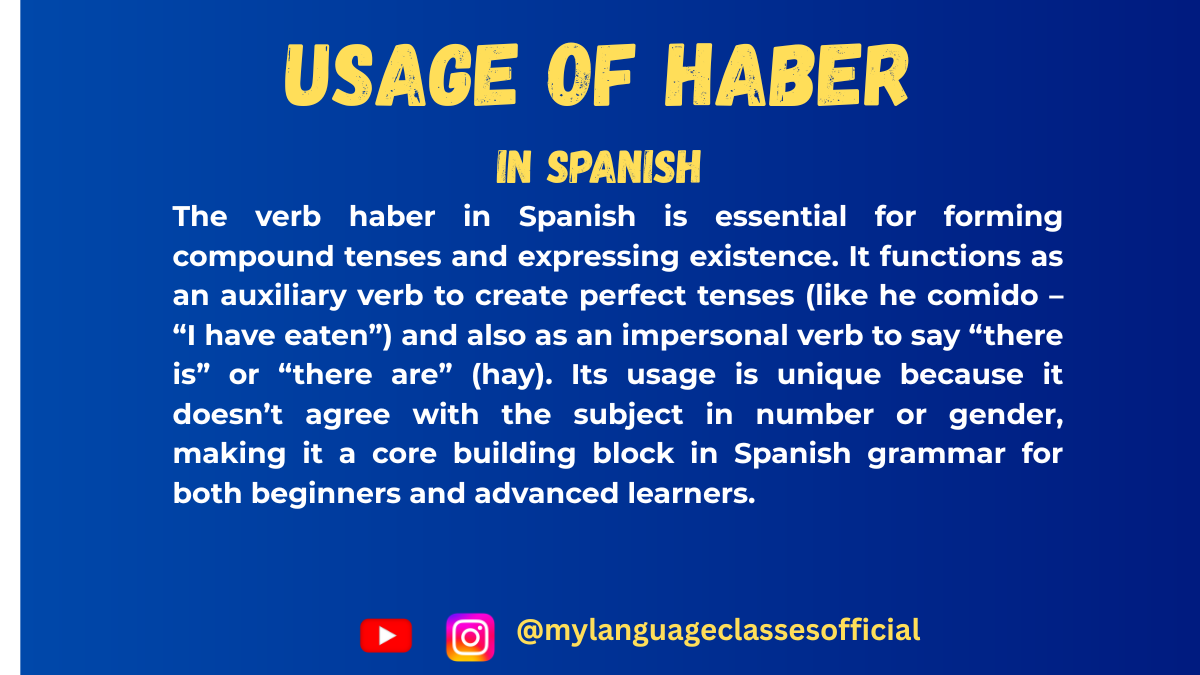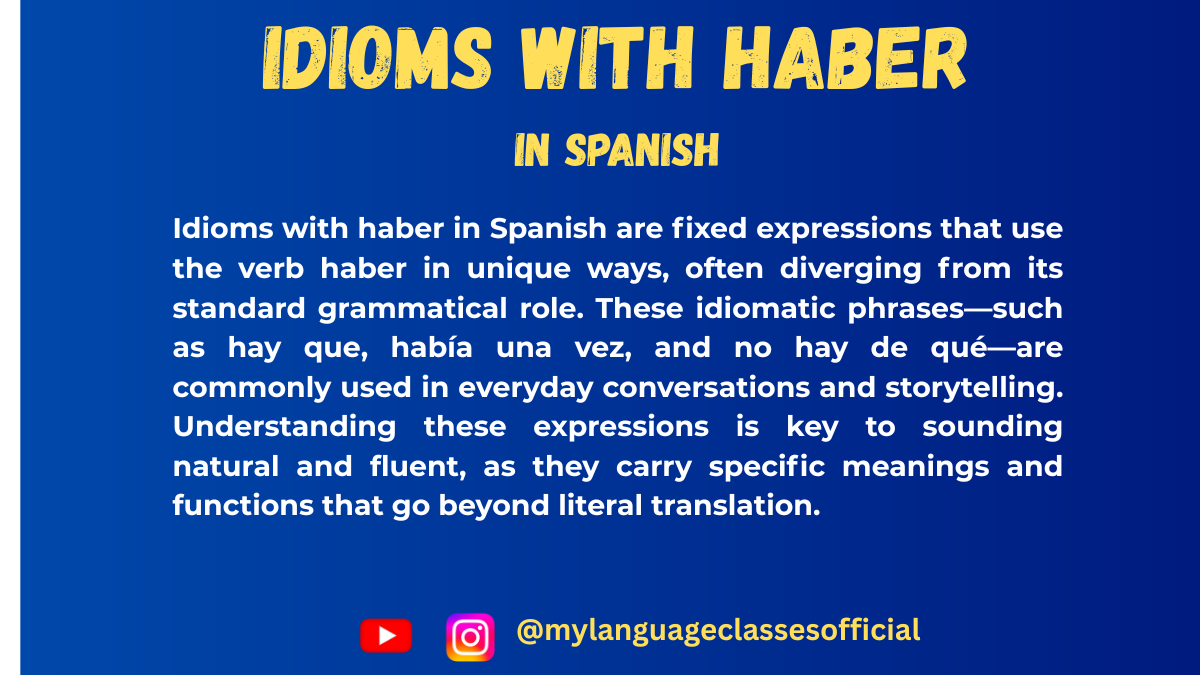Your cart is currently empty!
Tag: Spanish grammar haber
-

Mastering “Haber” in Spanish
The Spanish verb haber is one of the most versatile and fundamental verbs in the language. Understanding its uses, forms, and common expressions is essential for communicating effectively in Spanish. In this blog post, we will explore the different contexts in which “haber” is used, along with a list of commonly used expressions and examples.
1. What Is “Haber”?
“Haber” is an irregular verb in Spanish that serves multiple grammatical purposes. It does not directly translate into English but has different meanings and uses depending on the context. It can function as:
- An auxiliary verb: To form compound tenses.
- An impersonal verb: To express existence.
- Part of idiomatic expressions: Used in fixed phrases common in daily speech.
2. Forms of “Haber”
The conjugation of “haber” varies greatly depending on the tense and mood. Here are some key forms:
Present tense (indicative):
- He, has, ha, hemos, habéis, han
Past tense (preterite):
- Hube, hubiste, hubo, hubimos, hubisteis, hubieron
Imperfect tense:
- Había, habías, había, habíamos, habíais, habían
Subjunctive mood (present):
- Haya, hayas, haya, hayamos, hayáis, hayan
Impersonal form (used in expressions):
- Hay (present), hubo (preterite), había (imperfect)
3. Key Uses of “Haber”
A. As an Auxiliary Verb
“Haber” is used to form compound tenses, similar to “have” in English. It combines with the past participle of the main verb.
- Present Perfect (Pretérito Perfecto): Used to talk about actions that happened in the past but are relevant to the present.
- Example: He comido. (I have eaten.)
- Past Perfect (Pluscuamperfecto): Describes actions that occurred before another past action.
- Example: Había estudiado antes del examen. (I had studied before the exam.)
- Future Perfect (Futuro Perfecto): Refers to actions that will have been completed by a certain point in the future.
- Example: Habré terminado para las cinco. (I will have finished by five.)
B. As an Impersonal Verb
“Haber” is used in its impersonal form to express existence. The subject is not a person, and it is typically followed by a noun.
- Present Tense:Hay (There is/There are)
- Example: Hay un libro en la mesa. (There is a book on the table.)
- Example: Hay muchas flores en el jardín. (There are many flowers in the garden.)
- Past Tense:
- Hubo (preterite): Refers to events or existence at a specific moment in the past.
- Example: Hubo un accidente en la carretera. (There was an accident on the road.)
- Había (imperfect): Describes an ongoing or habitual past situation.
- Example: Había mucha gente en la fiesta. (There were many people at the party.)
- Hubo (preterite): Refers to events or existence at a specific moment in the past.
- Future Tense:Habrá (There will be)
- Example: Habrá una reunión mañana. (There will be a meeting tomorrow.)
C. Common Expressions with “Haber”
Here are some of the most common idiomatic expressions with “haber,” their meanings, and example sentences:
- Hay que + infinitive
Meaning: One must/It is necessary to.- Example: Hay que estudiar para aprobar el examen. (One must study to pass the exam.)
- Haber de + infinitive
Meaning: To have to (mild obligation or future intention).- Example: He de hablar con ella. (I must talk to her.)
- Haber lugar
Meaning: To have room or to be possible.- Example: No hay lugar para más invitados. (There is no room for more guests.)
- No hay de qué
Meaning: You’re welcome (literally, there is no reason to thank).- Example: Gracias por tu ayuda. No hay de qué. (Thanks for your help. You’re welcome.)
- Haber que ver con
Meaning: To have to do with something.- Example: Eso no tiene nada que ver conmigo. (That has nothing to do with me.)
- Habérselas con alguien
Meaning: To deal with someone (often confrontational).- Example: Hoy me las he tenido que ver con mi jefe. (Today, I had to deal with my boss.)
4. Things to Keep in Mind
When using “haber,” remember the following:
Articles and Gender:
- “Haber” in its impersonal form (hay, hubo, habrá) is not influenced by the gender or plurality of the noun that follows.
- Correct: Hay una silla. (There is a chair.)
- Correct: Hay cinco sillas. (There are five chairs.)
Auxiliary Verb Agreement:
- When used as an auxiliary verb, “haber” agrees with the subject of the sentence, not the object.
- Correct: He visto la película. (I have seen the movie.)
Idiomatic Nuance:
- Expressions like hay que are impersonal and do not conjugate for different subjects.
5. Practice and Examples
To master “haber,” practice by forming sentences in different tenses and exploring idiomatic expressions. For example:
- Hay un perro en el parque. (There is a dog in the park.)
- Había una vez un rey. (Once upon a time, there was a king.)
- Habrá una gran sorpresa en la fiesta. (There will be a big surprise at the party.)
Final Thoughts
Mastering “haber” is a key step in becoming fluent in Spanish. Whether forming compound tenses, expressing existence, or using idiomatic expressions, this verb is integral to daily communication. Keep practicing, and soon, it will become second nature.
Do you have favorite expressions with “haber”? Share them in the comments!
If you enjoyed this lesson, be sure to check out more posts like this on my blog at My Language Classes. Don’t forget to subscribe my YouTube channel and follow me on Instagram for the latest language learning tips and lessons. Leave a comment below to share your thoughts, or ask any questions you have.

